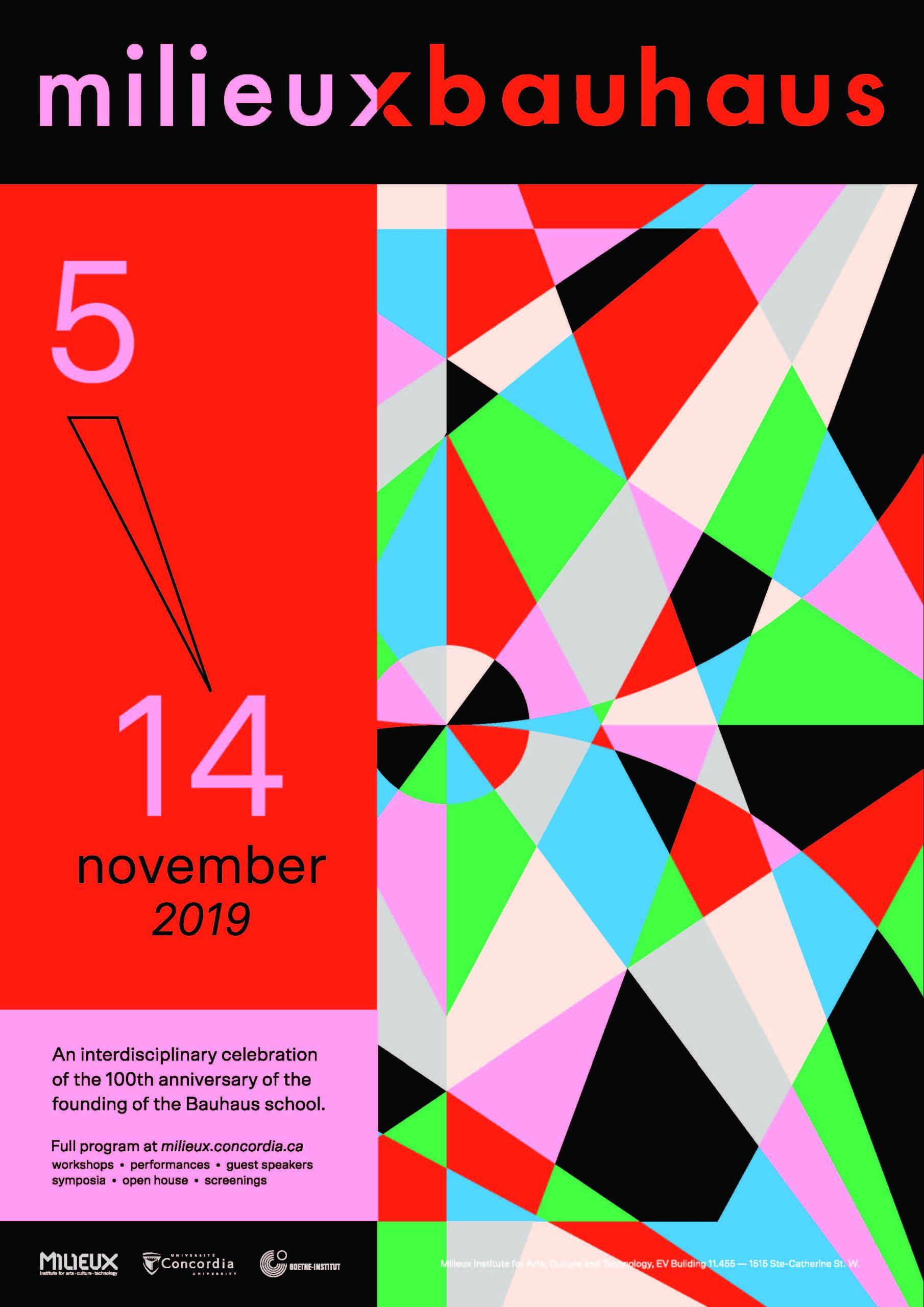
Panelists: Julie Richard, Alison Peacock, and Hilary Bergen
- Alison Peacock presents: Space Dance: A lecture demonstration in 100 years of ‘space’
The masks of Oskar Schlemmer’s Space Dance are emblematic of the Bauhaus’s theatre workshop’s proposal to emphasize mathematical approaches to human movement by obscuring the emotional content of performing bodies, foregrounding dance’s formal and spatial qualities. Dance scholar Gabriele Brandsetter points to ‘three criteria – “metamorphosis”, “body-space relationship” and “abstraction.” – (which became) paradigms for Schlemmer’s exploration of kinetics as an experimental artistic process.’ (54) This lecture demonstration will emphasize and imaginatively reconfigure the experimental dimension of Schlemmer’s kinetic approach to movement and space, while considering multiple meanings of ‘space’ in the context of 2019.
2. Julie Richard présente: Créatrices avant tout! Le contexte d’apprentissage des femmes au Bauhaus et quelques réalisations majeures (en francais)
Le Bauhaus de Weimar, dès sa conception par Walter Gropius, est imaginé non seulement comme une institution propice au développement des expérimentations des concepteurs d’avant-garde et à la production en industrie de leurs prototypes, mais aussi comme un haut lieu d’apprentissage émancipateur et paritaire. Bien que le travail des femmes soit valorisé dès les premières années de fonctionnement du Bauhaus, certaines normes de division entre les sexes demeurent palpables dans sa structure, contribuant à minorer l’apport des femmes au sein de l’école. À la lueur des études féministes sur les genres, cette communication traitera des conditions d’apprentissage des femmes au Bauhaus ainsi que des apports esthétiques et techniques de certains travaux.
3. Hilary Bergen presents, “Why Humans at All?”: Oskar Schlemmer’s Triadic Ballet as Precursor to Digital Mo-Cap Choreographies
A 1923 review of Oskar Schlemmer’s Triadic Ballet critiques Schlemmer’s material enhancement of his dancers’ bodies through the use of costumes, stating that in concealing (or congealing) it under grotesque garments, the body is “deprived of its best in dance…making it into a soulless machine.”
My presentation imagines Schlemmer’s fantasy of body extension and the dancing puppet as a precursor to today’s computer choreographies, where motion capture technology is used to mine lively movement from the human body in order to animate avatar dancers and their CGI-prosthetic bodies and digital “costumes.” In putting Bauhaus-era representations of the body in conversation with digital-era embodiments, where “life” is often contingent upon mediation, I explore the historical link between the practice of dance and the concept of “soul” to consider how dance might articulate cultural ideas about agency, control and embodiment.
WHEN? Thursday, November 7, 2:00 p.m. – 4:00 p.m.
About the Presenters:
Allison Peacock has developed an artistic practice committed to expanding the possibilities of dance and choreography, experimenting with forms of presentation, representation, potentiality, and imagination. She holds a BA from the University of Toronto in Political Science and Visual Studies, is a graduate of the School of Toronto Dance Theatre’s Professional Dance Training Program, and completed her MA in Solo/Dance/Authorship at the UdK/HZT Berlin. She has trained, taught, and performed internationally, most recently performing at Documenta 14 for artists William Pope L and Stefanos Tsivopoulos. Her solo and collaborative works have been presented at the Canada Dance Festival, Dancemakers, Fabrica de Pensule, Movement Research at the Judson Church, National Dance Centre Bucharest (CNDB), Salonul de Proiecte, Uferstudios, FOFA gallery, and numerous non-traditional performance spaces. From 2006-11, Allison worked professionally as a gardener in Toronto, with a speciality in topiary, hedge, and knot garden clipping. She is currently a doctoral student in the Interdisciplinary Humanities program at Concordia University, researching performance and contemporary physicality through local gardens and gardening practices.
Julie Richard est doctorante en histoire de l’art à l’Université du Québec à Montréal. Elle est également membre de l’Institut de recherche en Études Féministes de l’UQAM (IREF), du CÉLAT-UQAM et du Centre Figura. Son projet bénéficie du soutien financier du Fonds de recherche du Québec – Société et culture (FRQSC). Elle s’intéresse aux démarches interdisciplinaires des femmes européennes et américaines de l’entre-deux-guerres caractérisées par la pluralité des médiums utilisés, tels que la production de poupées, l’art d’infiltration, la performance, les pratiques furtives ou performatives ainsi que la photographie. Ses recherches doctorales portent sur les relations entre le corps, l’espace et l’architecture et procèdent à l’étude de performances artistiques réalisées dans l’espace public, tant en art moderne que dans les années 2000. En avril 2018, Julie Richard donnait une conférence sur les performances de la baronne Elsa von Freytag-Loringhoven à l’Université Oxford (Royaume-Uni) dans le cadre du colloque Queer Modernisms. À l’automne 2019, elle publiera un article portant sur la production de poupée-portraits et de marionnettes de Marie Vassilieff dans la revue scientifique anglaise Sculpture Journal (Liverpool University Press).
Hilary Bergen is a trained dancer and PhD student in Interdisciplinary Humanities at Concordia University in Montreal, where she studies screendance, posthumanism and feminist media history. Her work has been published with Screening the Past, Culture Machine, PUBLIC (forthcoming) and Word and Text.

